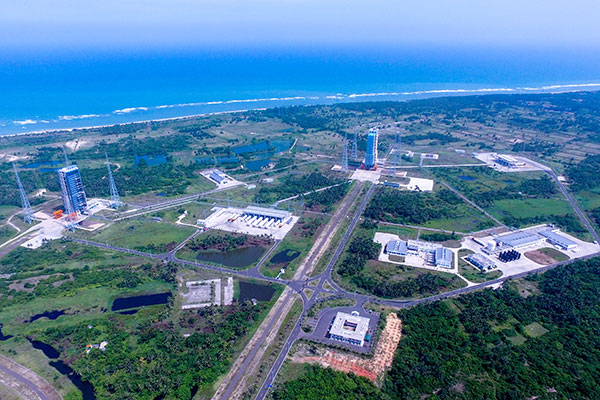
Wenchang satellite launch center, near the shoreline in Hainan province.[Photo/Xinhua]
Back in 1988, when Hainan island split from Guangdong province and became a province of its own, it was undeveloped. Its economy was dominated by low-productivity agriculture and fishing, which together generated half its GDP of 7.7 billion yuan ($1.1 billion).
But science and technology have played a decisive role in recent years in Hainan, and are serving as a new driver of economic growth.
According to Hainan officials, the island province will focus on technologies embracing such things as hybrid seeds, deep-ocean research and space exploration, for which it has unique geographical advantages, and make them leading players in the country over the next five years.
Three tech cities will likely be launched within the year to enhance those sectors, they said.
With advances in science and technology, Hainan has earned a reputation as an agricultural leader. It is now said to be China’s largest “winter vegetable basket” and is considered a “Silicon Valley” of seed breeding.
Nearly 18,000 hectares, or about 33.5 percent of the island’s farmland, are under protection as permanent prime land for crops, and ensure that Hainan will become the country’s largest base for seed breeding.
Every year from September until May, more than 6,000 scientific research personnel from 30 provinces and regions in China — including the country’s “father of hybrid rice”, Yuan Longping — are drawn to Sanya, Lingshui and Ledong in southern Hainan, to immerse themselves in hybrid seed research in ideal tropical island weather.
“Hainan used to provide us fields to carry out research, but more supporting facilities, high-tech laboratories and accommodations, are also provided nowadays,” said Hua Zetian, a scholar of the National Hybrid Rice Engineering Technology Research Center. Hua has worked in Sanya for 30 years.
The Hainan provincial government has injected 200 million yuan for seed breeding technology, and the transfer of the knowledge into industrial production.
The output of winter vegetables on the island has notably increased, thanks to the application of new farming science and technology.
Winter vegetable planting has expanded to 194,000 hectares, producing 3.41 million tons of vegetables, which are sold in cities outside the island. Profits have reached 10 billion yuan, according to Ke Yongchun, head of the Sanya Science and Technology Academy, part of the Base of National Breeding and Multiplication.
“Seeds cultivated in Hainan have been sold in countries and regions involved in the Belt and Road Initiative,” Hua said.
Hainan will emphasize science and technology innovation to boost its 12 pillar industries’ development — including tourism, high-efficiency agriculture, internet-based business, exhibitions and marine economy — in the next five years, according to the annual government work report released in January.
Haosheng village, near the Wenchang satellite launch center — China’s fourth — is growing vegetables and fruit varieties that were developed with help of space technology, and developing space-technology-themed tourism that helped increase its villagers’ income by 52 percent last year.
China’s first deep-sea research institute, the Institute of Deep-Sea Science and Engineering, which is affiliated with the Chinese Academy of Sciences, settled in Sanya in 2016. Hainan will better explore its marine resources and improve naval technology, provincial officials said.
The added value of Hainan’s new high-tech industry rose 14.8 percent to 21.2 billion yuan in 2017, and the number of related enterprises increased from 127 in 2013 to 269 last year, according to Shi Yiyun, head of Hainan’s Science and Technology Department.
“We will stick to reforming science and technology mechanisms to provide a better environment for research,” said Guo Zhangcheng, Party secretary of Hainan’s sci-tech department. Hainan will also introduce more talent to foster greater vitality in innovation and entrepreneurship, Guo said.
